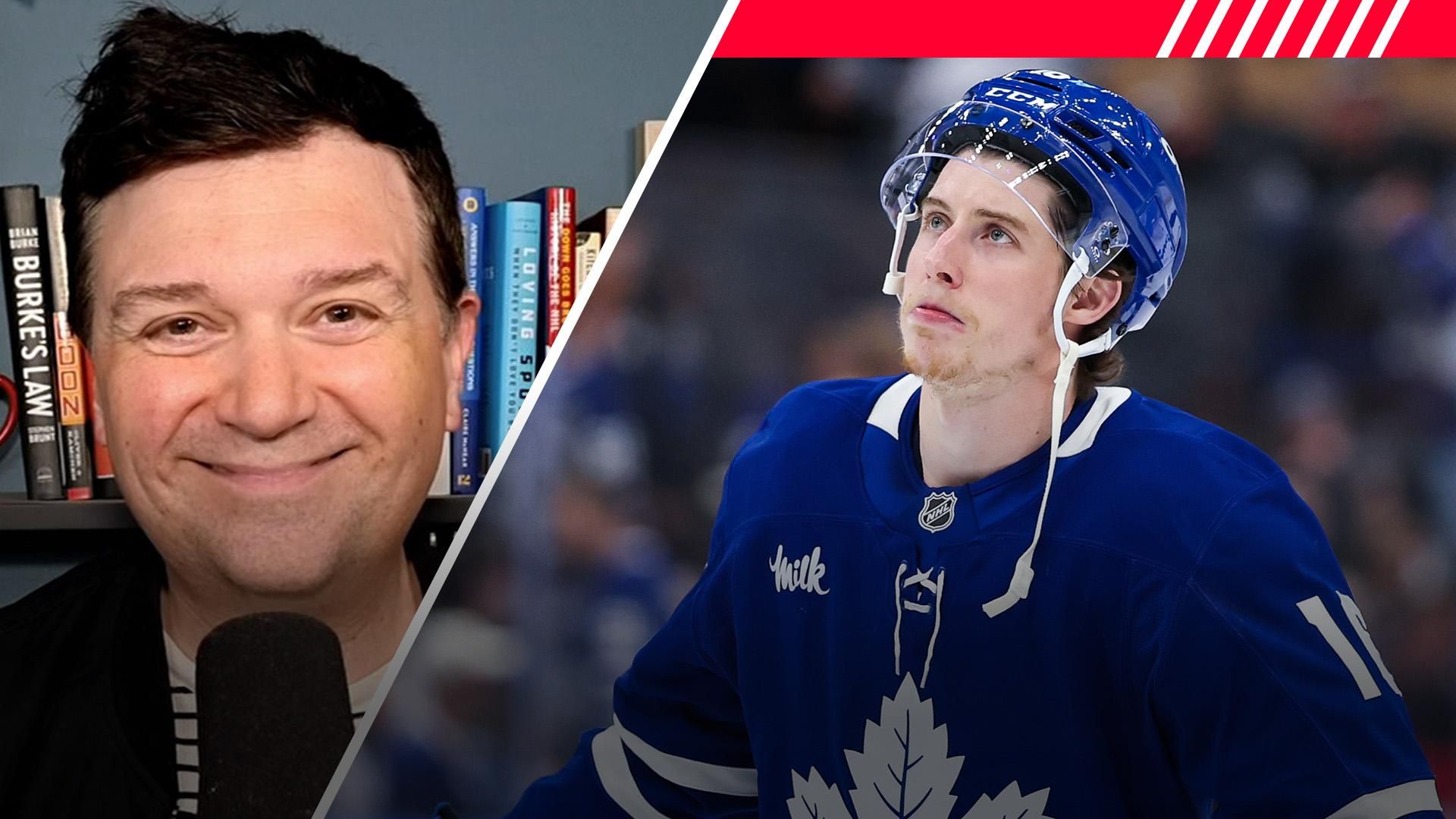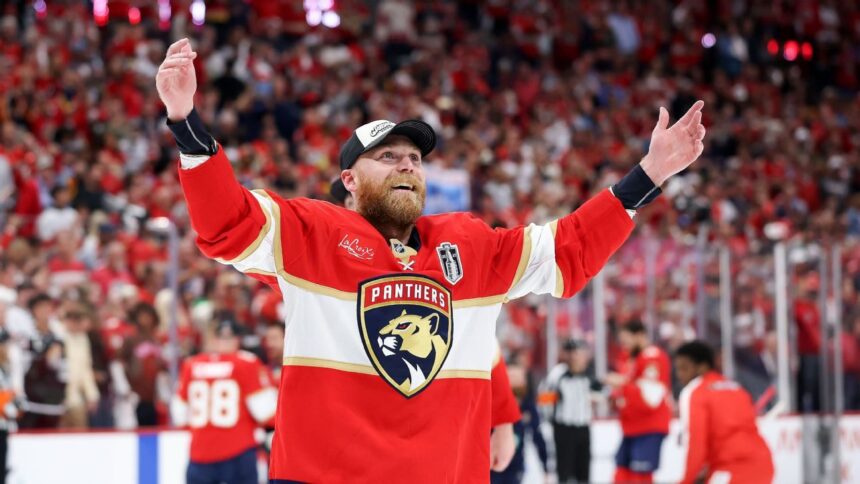The NHL Free Agent Market: Frenzy or Calm?
For NHL general manager of the year Jim Nill, the frenzy of this year’s free agents didn’t feel so frantic. “We knew there wasn’t much depth in this group of free agents,” commented Nill, of the Dallas Stars. “The salary cap has increased a lot, so teams can sign their own players. That’s an important part.” For NHL teams, that was a lesson learned. Here are four key takeaways from the opening of free agency this week.Higher Salary Cap, More Reasons to Stay Home
NHL teams are usually at the salary cap limit. This offseason, by comparison, was like entering a cathedral. The NHL and NHLPA announced in January that the upper limit of the salary cap for the 2025-26 season would be $95.5 million, an increase of $7.5 million from last season’s cap ($88 million). But the financial relief didn’t stop there. The NHL also announced salary cap estimates for 2026-27 ($104 million) and 2027-28 ($113.5 million), which could increase depending on revenue. This was an ingenious labor negotiation tactic for NHL commissioner Gary Bettman, who calmed any resentment from the players by showing them their potential salary growth if the current system was maintained. He also gave his teams the opportunity to spend aggressively to improve their rosters under a rising salary cap. But instead of fueling a free agent frenzy, greater financial flexibility created an opportunity for more players to stay home:- The Florida Panthers retained their trio of star free agents: Sam Bennett, Brad Marchand, and Aaron Ekblad.
- The Columbus Blue Jackets signed Ivan Provorov for seven years and an annual salary cap hit of $8.5 million.
- Brock Boeser, one of the most coveted scoring wingers on the market, signed a seven-year contract to remain with Vancouver, even after saying he believed his time there was over.
- Veteran scorers like Claude Giroux (Ottawa Senators), John Tavares (Toronto Maple Leafs), Matt Duchene (Dallas Stars), and Brock Nelson (Colorado Avalanche) stayed with their teams.
- Key defensemen like Jakob Chychrun (Washington Capitals) and Neal Pionk (Winnipeg Jets) avoided free agency months ago with new deals.
- While K’Andre Miller and Noah Dobson were traded, many more restricted free agents who could have been offer sheet targets re-signed with their teams, such as Evan Bouchard (Edmonton Oilers), Matthew Knies (Toronto), Logan Stankoven (Carolina Hurricanes), Morgan Geekie (Boston Bruins), Martin Fehervary (Washington), and Alexander Romanov (New York Islanders).
The free agent market was already going to be scarce this summer. The avalanche of talented players who decided to stay with their clubs made it barren for some positions in need.“What we’ve noticed in the last 48 hours is how many players re-signed with their own teams and didn’t even reach the free agent market,” said Columbus general manager Don Waddell.
Don Waddell
One of the reasons teams are active in free agency is to change the composition of their roster. But San Jose Sharks general manager Mike Grier noted that, with the extra space in the salary cap, more teams opted for players they were already familiar with instead of venturing into the unknown. “I don’t know if it’s correct to say that teams tried to sign their own players, but since everyone has a little more money, what the market could show is that, instead of teams overspending on someone they don’t know, it’s better to secure the player they know,” he said. There were still players who took the opportunity to go to new teams: Mikael Granlund, earning $21 million over three years with the Anaheim Ducks; Vladislav Gavrikov, earning $49 million over seven years from the New York Rangers; and, of course, Mitch Marner, earning $96 million to leave Toronto for the Vegas Golden Knights. But many more big names stayed. Every offseason, teams battle one of the axioms of NHL free agency: that players won’t leave their current teams because “their stuff is there.” Now, thanks to the soaring rise of the NHL salary cap, the challenge is greater: their stuff is there, and teams now have the financial flexibility to retain them.“I know everyone wants to talk about second-line centers. There are probably, by my calculations, 27 teams looking for them,” said Toronto general manager Brad Treliving. “The ones who have them aren’t giving them away that quickly.”
Brad Treliving
“Talking to other managers, there wasn’t as much financial pressure in terms of space that teams have,” Treliving said. “With the salary cap going up, everyone had more salary cap space to retain their own players.”
Brad Treliving
Problem of Manipulation in the NHL? Not Enough Teams Use it as an Advantage
Trying to suppress tampering before the NHL’s free agency is an absurd task. It’s not just that everyone talks to everyone else everywhere there are hockey people in the offseason, from the scouting combine to pubs and pubs near the combine, but the concept itself is difficult to define in the context of what the NHL cares about enforcing. It’s a bit like salary cap circumvention: they know when something goes too far when they see it.Ottawa owner Michael Andlauer accusing the Rangers of “soft tampering” last season because the New York Post speculated they would try to acquire Brady Tkachuk? The NHL didn’t care.
Vancouver Canucks general manager Jim Benning openly discussing the acquisition of players under contract like Steven Stamkos in 2016? NHL Deputy Commissioner Bill Daly imposed a $50,000 fine.
Daly has been in charge of the NHL regarding potential tampering. At a 2024 NHL general managers meeting, Daly gave a presentation reminding them of what was and was not allowed regarding communication with future free agents and other players under contract. Sportsnet reported that part of that review included possible penalties for tampering, ranging from a $5 million fine for a team and $1 million for an executive, with the possible loss of draft picks and suspensions also on the table. The reason for the lesson on manipulation: Daly didn’t like “some comments in the media around July 1st indicating that there might have been contact and negotiation before July 1st,” he told The Athletic. In the summer of 2024, we had situations like Tyler Bertuzzi telling the media that the captain of the Chicago Blackhawks, Nick Foligno, called him the day before free agency to inform him that his team was interested in signing him. Chicago’s general manager, Kyle Davidson, said: “We don’t ask them to do these things, but Nick cares. He knows a lot of people, loves the team, and wants to push this forward.” So, manipulation then…
There were speculations for weeks that Marner would play for the Golden Knights. According to him, the idea first took hold at the NHL trade deadline, when Vegas tried to acquire Marner in a three-way deal that failed. Marner said that was the first time he considered Vegas a long-term home for him and his young family. When he learned that Vegas and Toronto were talking about trades on Friday, Marner said he decided to forgo any free agent bidding war to commit to Vegas, so as not to “miss that opportunity”.
But Elliotte Friedman of Sportsnet said on his podcast last week that there was talk in the NHL that “the Maple Leafs will go after Vegas for tampering” with Marner. Teams had been on high alert since Daly’s comments. The idea was, according to Friedman, that the league might want to set an example with a team accused of tampering.Roy is a good player, who covers a need in the center for Toronto. Treliving declined to address speculation about manipulation. Vegas general manager Kelly McCrimmon was not directly asked about it during his press conference, but he made several statements that seemingly addressed the accusation, including:“If they make a deal with Toronto and send a good player to Toronto, I bet any chance of the Maple Leafs filing a tampering complaint goes away,” Friedman said.
Elliotte Friedman
- Discussions about the trade at the deadline “were initiated by Toronto.”
- The sign-and-trade was done to get an eighth year on Marner’s contract, or else his AAV on a seven-year, $96 million deal would have been $13.7 million. “That really impacts our ability to bring the player onto our team,” he said.
- The trade allowed them to open communications with Marner’s camp. “We wanted to be able to create an individual relationship with his representatives in terms of trying to get a contract done,” he said.
- Misinformation about his team surrounding free agency has been rampant, saying there is “a long list of things that have happened in the last month that had absolutely no credibility. It’s embarrassing, to be honest.”
The Panthers Have Maintained Their Dynasty… and Played Defense
Next season, the Panthers will try to do something that no club since the Islanders in the early 1980s could do: reach a fourth consecutive Stanley Cup Final and win a third consecutive Stanley Cup. That they did it with the services of center Sam Bennett, defenseman Aaron Ekblad and winger Brad Marchand, despite the fact that the three had the opportunity to test unrestricted free agency for the first time, is nothing short of extraordinary from a management point of view and irritating from a competitive point of view. General manager Bill Zito vowed he could sign Bennett, who won the Conn Smythe Trophy as playoff MVP; Ekblad, a top-tier right-handed defenseman, a coveted position on the open market; and Marchand, the veteran star who had the best series of his career in the Stanley Cup Final. But there were theories as to why the three might leave. Bennett could have gotten a big contract as a second-line center, an area of need for many contenders. Ekblad would enter a free agent market that lacked someone with his skills or pedigree. There was talk that Marchand could get $10 million annually from teams like Toronto or the Utah Mammoth in exchange for his scoring, leadership, and renowned intangibles. But in the end, Zito was right: the three are still part of the formidable Panthers core. Bennett was the first to sign for eight years and $64 million. Ekblad followed with eight years and $48.8 million. Marchand then signed for six years, making him a Panther until he is 43 years old, and $31.5 million.Bennett said he was comfortable with the money, but that money can’t buy happiness. “There have been times early in my career when I didn’t enjoy it as much, and I certainly don’t take it for granted now,” he said. “Being in South Florida has simply changed my life completely, and I love playing hockey there. I love living there. It really is the ideal situation. So I couldn’t pass up the opportunity to come back here for another eight years.” Ekblad was selected first overall by the Panthers in 2014 and never wanted to leave. His negotiation was a bit more tense with Zito. “Both sides play hard at different times and sometimes you feel like you’re moving away or closer,” he said, “but finally it came to the right agreement and a good deal for both sides.” Zito also played a bit defensively here. Signing Bennett means no one else gets a win-at-all-costs playoff MVP in their prime. Ekblad won’t patrol the blue line for Carolina, Dallas, or another contender. The Leafs seemed to be saving their powder to try to get Marchand, who was a Toronto fan growing up. The Panthers themselves said that last year’s Toronto team was the toughest they’d seen in the playoffs in years. What could the injection of Marchand’s cunning, and the elimination of the Leafs’ biggest postseason adversary from an opponent, do with one of Florida’s main divisional rivals? But Treliving didn’t delude himself about stealing any of them from Florida.“I didn’t do anything. It was those guys. There’s no gray area at all. This was 100 percent those guys wanting to be part of something they created,” Zito said. “We’ve spoken poetically about the team and the community they’ve become, and this is a great example of what it means to them.”
Bill Zito
And they’re back, for several more runs at the Stanley Cup, on a roster packed with high-end talent that fits perfectly under the salary cap. Inevitably, the conversation about the Panthers returns to one of the NHL’s most ubiquitous debates: the advantages that teams without state taxes have over the rest of the league. Zito has addressed this before, calling the advantage “marginal at best” for the Panthers, saying it’s more about team ownership and how players are treated.“We’re not in their meetings, but when we look from afar, the anticipation was that those guys would return,” he said.
Brad Treliving
Dallas general manager Jim Nill also has a state with no income tax.“They know that if the chicken isn’t right, we’re going to get a new chicken. Somehow it transcends everything we do,” he said with a laugh. “It sounds silly, but it’s true and it’s real. The sun doesn’t kill us. It’s a nice environment to live in. It’s a good place for families. It’s a good place for singles. It has something for everyone. But many of the players who have come to us have had years of career and it’s a function of the coaches and the players in the room.”
Bill Zito
Ekblad echoed that when discussing why he, Bennett, and Marchand decided to stay. And why players like Aleksander Barkov, Matthew Tkachuk, Sam Reinhart, Carter Verhaeghe, Anton Lundell, and Gustav Forsling are all signed until 2030. From the quality of their practice rink to the hotels they stay in and the food they devour, he said the organization does everything for them at a high level of satisfaction.“Are there some advantages? Yes, but every city has certain advantages. In the end, it’s ‘do you have success?’ Because that will open the door first when you talk to the players,” he said. “When the money is the same, the players want to win. That’s what’s important.
Nobody wanted to go to Florida for 10-12 years. Dallas, 15 years ago, was bankrupt. Nobody came here. So do things right, be competitive, have a good team, that means you’ll usually have a good fan base. Excellent weather, a great city… those are like the cherries on the cake. But the core was hockey operations”.
Jim Nill
“So it’s easy to want to stay here. And then the winning culture is a big attraction for the guys. It’s the most important thing. That’s why we play the game. We’ve all been taken care of extremely well,” Ekblad said. “I don’t know how many teams in the league have 10 guys locked up for five years, but it’s really great. There’s a pride factor involved.”
Aaron Ekblad
There Are Always Winners (Perceptual) and Losers
In 2019, the Florida Panthers signed Sergei Bobrovsky to a seven-year contract with an average annual value of $10 million. At the time it was called the “biggest free agency overpayment”; as recently as two years ago, it was considered one of the worst contracts in the NHL. Two Stanley Cups, three trips to the final, and a rising salary cap later, the investment in Playoff Bob is a bit more justifiable. That’s just a reminder that this week’s big signings or bad decisions are inherently just a first impression. It could be years before their impact can be properly measured beyond what are calculated risks at best or leaps of faith at worst. All that being said: There are clearly teams that have come out of the early days of the frenzy with better prospects than others. After speaking with some NHL sources this week, one team that has gotten good grades is the New York Rangers. An active NHL player told us he loved the signing of defenseman Vladislav Gavrikov (seven years, $7 million AAV) as the best defensive defenseman available, and a new partner for Adam Fox. Multiple sources were fans of the bridge deal for forward Will Cuylle (two years, $3.9 million) as a reasonable cap hit for a budding player, while keeping him away from offer sheets. An NHL capologist also admired the K’Andre Miller trade to Carolina, turning a potential offer sheet target into a first-round pick, a second-round pick, and a young puck-moving defenseman in Scott Morrow, while clearing space on the salary cap that Gavrikov quickly filled. As expected, there was a lot of love for what Florida did in retaining its three unrestricted free agents. A current NHL coach said it was a “master class” by Zito, taking full advantage of a rising salary cap to retain Bennett, Ekblad, and Marchand. But another source wondered how the Panthers will ultimately start the season under the salary cap, as they are about $2.95 million over at the moment. Options range from trading a player like Evan Rodrigues to potentially starting the season with Matthew Tkachuk on long-term injury reserve. Zito did not offer an update on Tkachuk’s status during his press conference on Tuesday.
- Boston Bruins: While the Bruins made a good deal by securing RFA Morgan Geekie with a six-year contract with an annual salary impact of $5.5 million, that goodwill was wasted with the signing of forward Tanner Jeannot to a five-year contract with an AAV of $3.4 million. Since scoring 24 goals in 2021-22 for Nashville, Jeannot has scored a total of 20 goals in the last three seasons with the Predators, Lightning and Kings. A source compared the signing to Bruins general manager Don Sweeney signing forward Matt Beleskey to a five-year contract with an AAV of $3.8 million in 2015. He had 18 goals in 143 games for the Bruins. In the third year of the deal, he was in the AHL.
- Los Angeles Kings: New general manager Ken Holland went on a shopping spree on Tuesday, signing forward Joel Armia (two years, $2.5 million AAV) and Corey Perry (one year, $2 million); defensemen Brian Dumoulin (three years, $4 million AAV) and Cody Ceci (four years, $4.5 million AAV); and goaltender Anton Forsberg (two years, $2.25 million AAV). The moves were not met with universal praise from Kings fans. An NHL player we spoke to said his teammates have offered a similar reaction. “Everyone I’ve known couldn’t believe what they did,” he said.
- Vegas Golden Knights: While the signing of Marner was praised, there was some concern from our sources about the overall depth of the team. That included the transfer of sixth-line center Roy to Toronto to facilitate the signing and transfer agreement with the Leafs for Marner. An NHL coach was also curious about the defense corps next season, given that the team announced that Alex Pietrangelo will no longer be an active NHL player due to injuries, and that they traded RFA defenseman Nicolas Hague to the Predators, a player the coach felt was “very underrated.”










